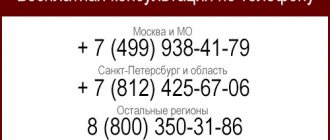The category and area of living space do not play a significant role. A child can be registered in the mother’s home even if the required living space standards for one person are not available. The main condition is that the premises must be residential according to the documents.
Dear readers! The article talks about typical ways to resolve legal issues, but each case is individual. If you want to find out how to solve your particular problem , contact a consultant:
8 (800) 700 95 53
APPLICATIONS AND CALLS ARE ACCEPTED 24/7 and 7 days a week.
It's fast and FREE !
Permanent registration of a child outside the mother's place of residence is possible if the minor is at least 16 years old and has received consent from the mother to live separately.
Registration of a minor outside the mother's place of registration is possible for other valid reasons - for example , when the mother is deprived of parental rights and the child cannot live together with her.
Concept
The term "propiska" is still widely used.
At the legislative level, it was abolished in the early 90s and replaced by the concept of “permanent registration”.
It is of a notification nature and does not require permission from state authorities and municipalities.
Permanent registration is a legally valid and officially registered fact of a citizen’s residence in a certain living space.
Permanent registration must be distinguished from registration at a place of temporary residence. It must be limited to a specific period, while the well-known term “registration” implies the right to live indefinitely in an apartment or private house.
Questions regarding the registration of a child if the parents are in a civil marriage or divorced
- mother's new marriage;
- does the homeowner agree?
- whether the father is the owner of the apartment;
- how many square meters per resident;
- Is there arrears in paying utility bills?
We recommend reading: New Laws for Mothers of Many Children From January 1, 2020
In order for the offspring to inherit the surname of his biological father, he must undergo a paternity establishment procedure , which in practice is expressed in the father’s application to the registry office with a statement that he recognizes the child as his own and asks to register under his surname (Article 51 of the RF IC).
Rights of minor children
A child has the right to be raised in a family and live with his parents. The procedure for exercising parental rights is established in Art. 65 RF IC . If parents are not deprived or limited in parental rights, then they decide together on the issues of determining the child’s place of residence and place of registration.
The exception is when the court decision states that the child must live with the mother. Then she has the right to register the child without the father’s permission, but it must be at the mother’s place of residence.
Civil Code of the Russian Federation - Art. 20 prescribes the obligation of children to live at the place of residence of their parents.
- Children over 16 years of age can choose their place of residence with the permission of their parents and legal representatives.
- A child over 14 years old applies for registration at the mother’s place of residence independently.
If the child is registered with the father during a divorce
If spouses divorce, the issue of dividing the apartment and children becomes the most controversial. Usually a minor citizen is left to live with his mother.
However, if the child is registered with the father during a divorce , this may cause additional difficulties. In this situation, a man is able to begin to lay claim to the sole upbringing of his offspring.
The citizen is confident that the court will side with him in this situation. In practice, the issue is not resolved quite this way.
The court may indeed decide to place a son or daughter in the sole custody of the husband if the mother behaves inappropriately. Such behavior includes the use of drugs, alcohol and poor lifestyle choices. A minor citizen can also be transferred to his father if the woman suffers from dangerous infectious diseases.
Cruel treatment can also become a reason for making a decision to transfer the offspring to the husband and depriving the wife of parental rights, even if they are not registered with him. In other situations, the proceedings will take place on classical grounds.
We’ll talk further about what to do in such a situation, what to do if a child took part in privatization, and also what to do if a minor has a residence permit in real estate acquired before marriage.
The property was purchased before the formal conclusion of the relationship
All property that a husband and wife purchased during marriage is joint property. During a divorce, it is divided in half.
If the housing was purchased before the official conclusion of the relationship, and the second spouse was not registered in it, the apartment continues to remain the sole property of the citizen.
If registration on the property has been carried out, spouses and children will retain the right to live in the premises even after a formal divorce.
If the child is registered in his father’s apartment and lives with his mother, the court will take into account all the nuances when making a decision. The government agency strives to ensure that the final verdict does not infringe on the interests of the minor.
In most situations, the court leaves the son or daughter with the mother, even if the minor is registered in the father’s apartment, the woman actually lives at a different address.
It will be possible to take away the offspring after a divorce only if, as a result of the court proceedings, an appropriate decision is made.
If a woman is not registered in her husband’s apartment, which was purchased before marriage, the ex-wife has no right to claim a share in the premises. However, a similar opportunity remains for a son or daughter. A minor citizen has the right to live in his father’s apartment after a divorce, but only without his mother.
Housing belongs to the state
If the housing has not been privatized, the family does not have ownership rights to the premises. The mother's rights to such real estate will not be lost in the event of a divorce.
Even if the ex-husband is the tenant, he cannot do the following with her:
- sell property;
- divide property;
- discharge a son or daughter;
- kick your spouse out of the property after a divorce.
The rule also applies if the woman does not live in the property for some time. A minor citizen also does not have the right to housing after his parents’ divorce, since the state continues to be its owner.
If the offspring is registered in the apartment, his mother can go to court with a demand to be allowed to live on the premises if the spouses could not resolve this issue on their own. It will not be possible to discharge a minor citizen from housing after a divorce.
Housing was purchased or privatized during marriage
If the living space was privatized during the marriage, this does not always make it possible to sue for a share in it. The mother and offspring will not have rights to the apartment in the following situations:
- the privatization procedure was carried out without their participation;
- there is no registration on the territory of the real estate;
- the woman did not pay for housing maintenance.
If the property privatization procedure was completed without the participation of the mother or child, it is considered that the apartment belongs entirely to the husband. Only he has all rights to the living space. In this case, the property is not divided during a divorce. In this situation, the same actions are performed that are performed in relation to real estate acquired before marriage.
A woman will receive the right to a share in real estate if she participated in the privatization of property or invested her own funds in repairs, as well as the acquisition of property located in the apartment.
If a dispute arises regarding the child’s place of residence, it is likely that the son or daughter will be left with the mother, and the father will receive the right to visit the minor citizen on certain days.
Son or daughter took part in the privatization of real estate
When figuring out what a child can claim after a divorce, you need to take into account that the process of dividing real estate will largely depend on the share received by the parents and their children during the privatization of the property.
If only the husband took part in the procedure, he will be the sole owner of the property. In this situation, the premises are acquired through a gratuitous transaction.
The process is carried out in compliance with the provisions enshrined in Article 34 of the RF IC.
If the offspring was registered in an apartment privatized by the husband, the court in most cases will still leave the son or daughter with the mother, even if they are registered with the father. However, there is still a chance for a man to be recognized as a guardian.
In order to raise a child on his own, the ex-husband must prove that the ex-wife is not able to provide the minor with everything necessary. If there are compelling reasons, parental rights may be terminated.
However, in this situation, you will need to provide evidence of compliance with the requirements of current legislation. In other situations, the child will remain with the woman, regardless of where he is officially registered.
Source: https://YurPortal.info/rastorzhenie-braka/esli-rebenok-propisan-u-ottsa-pri-razvode/
Options
Registration at the mother's place of residence is carried out with the consent of the father, if he is included in the birth certificate, and if there is no court decision on the child's place of residence.
In other situations, the mother has the right to register the child at her place of residence without the father’s permission.
A similar procedure exists if the father registers the child at his place of residence. Permission can be granted in notarial or simple written form.
Without father's consent
In many situations, the registration of a child at the mother’s place of residence is carried out without the presence of the father.
To do this, there must be legally significant confirmation:
- court decisions;
- information about the unknown absence of the second parent;
- information that the father does not communicate with the child and it is impossible to obtain permission for registration.
At the place of residence
Registration of a minor must be carried out at the place of residence of the mother or father.
This could be an apartment, a private house, a room in a dorm or a communal apartment.
For registration of minors - in case of shared ownership of real estate, the consent of the other owners is not required.
The premises where the child is registered must be intended for residential use.
It is prohibited to register minors and other residents in industrial, warehouse, basement and other premises.
Without the owner's consent
A mother has the right to register her child in any living space where she legally resides herself, including in another city where she has real estate. The consent of the remaining owners and other registered residents is not required.
Registration is carried out on a notification basis.
If title documents for real estate cannot be obtained from the owner, then specialists from the registration authority will fill out a separate request and receive an extract from the Unified State Register of Real Estate from Rosreestr.
Based on the information from the extract, specialists process the documents and register the child at the mother’s place of residence.
If the owner is against registration, then he has the right to go to court and demand that the registration of the mother in his living space be declared illegal ( for example , on the basis that the mother registered the child, but she herself never actually lived in the owner’s living space, did not pay for utilities, etc.). d.). A lawyer can represent the interests of the owner - by power of attorney.
Do you want to know where to get information about where your child is registered? See the article about this: certificate of registration of a child. It is written here whether it is possible to receive a fine for late registration.
If parents are divorced
Divorce of spouses with children is carried out only in court.
The father and mother must either agree on the place of residence of the child themselves, or the place of residence of the child is determined by the court.
If the court decision states that the minor must live with his mother, then registration at her place of residence after the divorce will be carried out without the consent of the father.
Single mothers
Registration of a child of a single mother is carried out at her place of residence. Consent from the father, even if he actually exists, is not required.
Single mother status is given when there is no record of the father on the birth certificate or when the child’s father has died and been declared dead in court.
Depriving a father of parental rights does not give the status of a single mother, since even in this case he must pay alimony and help financially in other possible ways.
If the father is a foreigner
When the father lives abroad, registration is carried out without his permission. This is possible if the mother has a permanent place of residence and is raising the child.
When a foreign father is on the territory of the Russian Federation, registration is also carried out without his permission, in the case where he does not have a permanent place of residence, does not communicate with the child, is deprived of parental rights or is limited in the right to communicate with the child.
Can a child live with his father and be registered with his mother?
The law also answers the question: how to register a child at the place of registration of the father? Children's rights Registration of a child provides for the approval of his legal rights, which include the right to:
- ownership of property;
- living together with parents;
- housing owned by a state or municipal fund;
- inheritance;
- acquisition under a gift agreement.
All privileges of a child are determined based on his residence with his parents, regardless of the type of living space and its affiliation.
How to register a child at the place of registration of the father? The law does not limit the right of a father to register children in his living space, but there are legal formalities that must be observed.
The main document that allows you to register a child at the father’s place of residence is the mother’s written permission, certified by a notary.
- if housing is used under a social tenancy agreement, then it is necessary to obtain the consent of all residents of this living space (Article 70 of the Housing Code of the Russian Federation);
- if the home is in privatized status, you need to try to get approval from all owners (Article 30 of the Housing Code of the Russian Federation, Part 1 of Article 246 of the Civil Code of the Russian Federation).
Article 70. The right of the tenant to move other citizens into the residential premises he occupies under a social tenancy agreement as members of his family
- The tenant, with the written consent of his family members, including temporarily absent family members, has the right to move into the residential premises he occupies under a social tenancy agreement his spouse, his children and parents, or with the written consent of his family members, including temporarily absent members of his family, and the lessor - other citizens as members of his family living with him.
How to register a child at the place of registration of the father. family law
Attention
Legislative framework Issues of registration of minors and newborns - citizens of the Russian Federation are regulated by the Civil Code (CC), Family Code (FC), Federal Law “On the Right to Freedom of Movement”, and other regulations.
In accordance with Article 20 of the Civil Code of the Russian Federation, a child (children) under 14 years of age are registered at the place of residence of the parents, and if the spouses have different registration addresses, then at the living space of one of them.
Registration is mandatory and may be necessary to interact with social structures such as a clinic, Pension Fund (PF), kindergarten and others.
The rights and responsibilities of the father and mother are established equally and are defined by Article 61 of the RF IC.
The child lives with his mother and is registered with his father
At the same time, if parents do not have ownership rights to the living space, but rent it from government agencies, then the registration of children is carried out regardless of the ownership of the premises.
Owner If housing is leased under a social tenancy agreement, then in accordance with Article 70 of the Housing Code (LC), the tenant has the right to move other citizens into the living space as family members.
Does the mother have the right to live at the place of registration of the child?
If this has not been achieved, the parties can go to court, which will determine the child’s place of residence. Article 65 of the Family Code establishes:
- The conflict between parents can be resolved in court.
- The court takes into account the child's opinion, if he can express it, and acts exclusively in his interests.
- The following aspects are taken into account: the child’s attachment to relatives, his age and interpersonal relationships with other family members, the parents’ work schedule, their behavior, social adequacy, and so on.
- Until such a court decision comes into force, the guardianship and trusteeship authority may determine the place of residence (registration) with one of the parents.
Often, the mother’s registered address is chosen as such a place, provided that she does not lead an antisocial lifestyle and provides proper care for the child.
Features of registering a child with his father
Can a mother live at the place of registration of a minor child? This issue becomes especially acute in the event of a divorce due to a decision to leave the child with the father.
As a result of divorce proceedings, children cannot be deprived of their shelter.
What about the adult family members? What rights does the ex-wife have regarding the use of the residential premises where the husband and child live? Can the owner of the apartment leave it at his place of registration?
- Children's rights upon divorce
- The mother’s rights to move into the child’s place of registration
- Documents for registration
Rights of a child upon divorce When a family breaks up, the stumbling block between former spouses is the question of who their child will live with.
From the provisions of current legislation it follows that a child cannot be left without a registered address.
If a woman is not registered in her husband’s apartment, which was purchased before marriage, the ex-wife has no right to claim a share in the premises. However, a similar opportunity remains for a son or daughter.
A minor citizen has the right to live in his father’s apartment after a divorce, but only without his mother. Housing belongs to the state If housing has not been privatized, the family does not have ownership rights to the premises. The mother's rights to such real estate will not be lost in the event of a divorce.
Even if the ex-husband is the tenant, he cannot do the following with her:
- sell property;
- divide property;
- discharge a son or daughter;
- kick your spouse out of the property after a divorce.
The rule also applies if the woman does not live in the property for some time.
Registration, although it is not a “limiter” on receiving social benefits according to the Constitution of the Russian Federation, is necessary for a child, even a newborn, in many situations: service in a clinic closest to home, enrollment in a kindergarten. The responsibility for registering children lies with the parents.
If the procedure is not carried out in a timely manner, they will be subject to an administrative fine. Legislative regulation of the issue A minor citizen and even a newborn child, in accordance with the law, has the same rights as the adult population of the country.
So, children are required to be registered. Responsibility for this always falls on the parents or other legal representatives. In 1993, Law No. 5242–1 came into force, regulating the rights of citizens of the Russian Federation regarding freedom of movement, choice of place of residence or temporary stay.
- Photocopy of the marriage certificate.
- An extract from the house register for apartment buildings or a house register issued for individual housing construction.
- An extract from the personal account for the living space in which the child will be registered.
- The mother's consent, which will be certified by a notary.
- During registration, original documents are provided, which require comparison with photocopies. Consent Agreement with the mother on registration at the father’s registered address is drawn up at any notary office and must contain:
- direct indication from the mother that she agrees to register the child at the father’s address;
- date of application;
- place of proposed registration.
The consent form can be drawn up by a notary, and if the required form is not available, the document can be executed in accordance with the above criteria. It's fast and free!
- Where should a child be registered after a divorce?
- The court will decide
- Why is it necessary to register a child?
- Does one of the parents have the right to live where the minor lives?
- What rights does a child have regarding registration after a divorce?
- How to complete the procedure?
- Documentation
Where should a child be registered after a divorce? As a rule, by the time of the trial, the separating parents have already agreed where and with whom the child will live, but if the degree of tension in the relationship does not allow dialogue, then the court will resolve this issue (Clause 2 of Article 24 of the RF IC). Article 24.
To resolve many issues, including increasing living space, you need a birth certificate for the child registered with me.
read answers (1) Topic: Living at the place of registration The child is registered with his father in a municipal apartment, and lives after his parents’ divorce from his mother in a rural area read answers (1) Topic: Rights of registered children 7 years old. registered from birth with his mother in the South-Western Administrative District of Moscow and has lived since birth with his father in the North-East Administrative District of Moscow.
the school's refusal to accept my son as a student. They say where he is registered there and go. read the answers (3) Topic: Eviction from the apartment After the spouses divorced, the child remained to live with his father, but was registered with his mother. More than 20 years have passed.
Source: https://lcbg.ru/mozhet-li-rebenok-prozhivat-s-ottsom-a-propisan-byt-u-materi/
Where to contact
You need to contact the territorial department of the Federal Migration Service at the mother’s place of residence.
- The application is completed at the passport office.
- It is possible to submit an application to the “My Documents” MFC.
- It is possible to register through the government services portal.
How to register a child at the mother’s place of registration through State Services
Then registration is carried out remotely.
Need to:
- register on the government services portal;
- select the section – services for individuals;
- select a territorial division of the FMS;
- choose
- read the application, fill out all fields;
- attach scanned documents to the application;
- submit an application and wait for a response to email and messages in your personal account.
The period of registration through government services cannot be more than 8 days. Formally, the deadline may be delayed due to a lack of specific documents.
Through MFC
Registration is carried out through the MFC within the same period. It cannot be more than 5-7 days .
But the MFC is not a registration authority, but is a link between the Federal Migration Service and the citizen. The application for registration is completed with the help of the center's consultants.
Registration and discharge of a child in case of divorce
We propose to consider the topic: “registration of a child at the place of registration of the father” with comments from professionals. We tried to explain everything in understandable languages and fully cover the topic. Read the article carefully and if you have any questions, you can ask them in the comments or directly to the consultant on duty. For example, it will not be possible to register a newborn at a clinic, enroll him in a kindergarten or school, apply for the necessary subsidies, social benefits, or receive maternity capital, to which the father is also entitled if there is no mother. According to Article 20 of the Civil Code, minor children under 14 years of age must be registered in the same residential area where one of his parents, adoptive parents, or guardians lives.
Divorce is almost always a rather painful procedure. It becomes especially difficult if children have already been born in the marriage, and after the divorce the parents are forced to decide where and with whom they should live.
Registration is the registration of a person at his place of residence. An extract represents the removal of a citizen from registration at the place of permanent residence. With whom and where the children will live after a divorce is determined by mutual agreement of the parents, or by a court decision, based on the interests of the minors, Art. When registering and discharging a child, it is important to take into account a number of circumstances, such as the age of the person, and whether the housing is privatized or not.
Registration of a child at the place of registration of the father
.
.
Procedure
You need to apply to the passport office. According to the regulations, the waiting period for an appointment with a specialist cannot be more than 15 minutes. There is no payment for registration, but in fact, payment may be charged for assistance in completing the forms.
Required documents
To find out how to register a newborn child at the mother’s place of registration in 2016-2017, you need to familiarize yourself with the list of documents.
The list includes:
- application for form No. 6;
the sample here.
- title documents for real estate;
- owner’s consent – if the mother is registered with the child at the same time;
An example is presented here.
- mother's passport;
- birth certificate of a minor;
- written consent of the father (not in all cases).
Registration is possible without a house register - if it cannot be obtained from the owner of a private house or it is not provided ( for example , in an apartment). The maximum period for registration - when submitting an application and documents in paper form - is three calendar days.
Want to know how to register your child correctly? Read about this in the article: registration of a child. About how to enroll a child in school without registration is written here.
For details about how long you can live without registration in your passport, see here.
Sample application
A sample application can be found in the appendix to administrative regulation No. 288 .
The form must indicate:
- information about the child’s parents;
- information about the child (full name, date of birth);
- information about your previous place of residence (if any).
The application must contain the date and signature of the official who accepted the documents.
Where should a child be registered after parents divorce?
Hello, Alexey! It is impossible to answer the question, which is not quite correctly posed, where the child should be registered. By virtue of the law, minor children follow their parents. After a divorce, the place of residence of minor children will be determined by the parents; in the absence of an agreement, it will be determined by the court. In your situation, I can recommend inviting the child’s mother to voluntarily register the child at her place of residence, since the child actually lives with her. It can also be justified by the fact that your registration is temporary (the temporary registration period is not known!), then the child can be recognized at any time as not having acquired the right to use the residential premises based on a court decision at the request of the apartment owner. You yourself cannot file such a claim, since the child is yours, and, as I understand, you are not the owner of the apartment in which there is registration.
We recommend reading: When is maternity leave granted?
The issue of the residence of children after the divorce of their parents is often controversial. According to statistics, in most cases the court remains on the side of mothers, but modern divorce proceedings are increasingly accompanied by the desire of fathers to keep their children.
Can a child be registered separately from the mother?
then he has the right to live separately from his parents, but only if his parents give their consent to this (mutual consent). Otherwise, the child is deprived of the opportunity to live separately from his parents, and will be able to exercise his right to separate residence only upon reaching 18 years of age.
We recommend reading: Working disabled person of group 3
Solving legal problems is a very interesting activity for me and my goal is to improve in this area. Arbitration disputes are of particular interest, since my first economic education and work experience gives me knowledge of the economic fundamentals of enterprises, knowledge of the principles of accounting, as well as the preparation and analysis of financial statements.
Procedure at the passport office or through the MFC
Registration is carried out according to the following scheme:
- the package of documents is handed over to the registration service employees;
- the application is given up to a week to be considered;
- a stamp is placed in the house register;
- The parents are given a Certificate of Registration (previously a stamp was placed on the certificate).
- There is no duty for Russian citizens; foreigners must pay 350 rubles.
This is interesting: How to attach a child to a children's clinic: at the place of registration, not at the place of residence
Registration procedure
Registration of a small citizen begins with the registration of a child's birth certificate .
The document should be obtained from the registry office on the basis of a certificate issued by the maternity hospital. This must be done within the first month of life .
Collection of other documents. These include:
- passport where the minor citizen will be registered;
- marriage registration document (if concluded);
- certificate No. 9 about everyone registered in the apartment;
- application for registration.
If the registration will be issued by the father when he lives separately from the child’s mother, then either the presence of the mother or a notarized permission .
the passport office for processing . The registration will be ready in no more than a week. A stamp indicating registration is affixed to the birth certificate .







